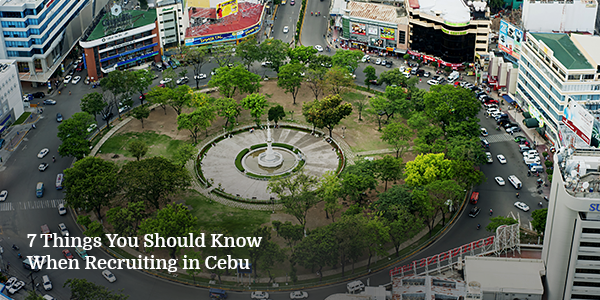Cebu, the Queen City of the South, is the second largest city in the Philippines, next to the capital city of Manila. In recent years, it has been recognized as a hub for commerce, serving as the home for all kinds of businesses. For recruiters and HR executives, the region offers much potential with the right approach.
Below are a few things about the city and its environment that you’ll find helpful for implementing hiring strategies and processes or engaging a recruitment agency in Cebu.
1. Rich culture and history
Cebu is home to a number of historical landmarks, like the Sto. Nino Church and Magellan’s Cross, given that it was the first city occupied when the Spaniards arrived. It is also the home of the Sinulog Festival, one of the most vibrant celebrations in the country, which is held every third Sunday of January. These hallmarks of Cebu’s culture and history attract much tourism, both from locals and foreigners alike. Tourism itself has become one of Cebu’s economic drivers, with approximately three million tourist arrivals in the Central Visayas region.
2. Strategic point for travel and logistics
Cebu has become a highly accessible location given the availability of direct flights between the region and places like Singapore, Hong Kong, Tokyo, Seoul, and Bangkok. The numerous ports located in Cebu also cater to various options of sea travel and logistics. Because of this, Cebu has become a hub for the trade and manufacturing industries in southern Philippines.
3. Balanced city living
With the recent developments in infrastructure and ever-growing industries, Cebu has a cluster of thriving commercial areas and up-and-coming residential spaces. While these new features may seem typical for a city like Manila, it is better planned as real estate developers tend to integrate living and working places around major CBDs in the area. Cebu is also the home to natural scenic spots like white-sand beaches and dive sites, balancing out the urban landscape and providing leisure activities within reach.
4. Varied career options
Aside from being the southern center of the country’s trading and manufacturing industries, there are many others that have taken root in Cebu. Industries like construction, information and communication technology (ICT), business process outsourcing (BPO), and knowledge process outsourcing (KPO) have set up shop in the region, creating job opportunities for various levels—ranging from entry-level positions to more experienced managerial or specialist roles.
The city is also home to many start-ups, offering more flexible and unconventional listings for those interested. Given that the business environment is less cut-throat than in the capital, smaller businesses have a bigger chance to fill up their ranks.
5. Rapid business growth
Both the government and the private sector have contributed to economic development in the Central Visayas region, with Cebu as the most prosperous. In fact, 56% of Metro Cebu’s total economic output is from various industries, with services accounting for 36%. Additionally, through the administration’s “Build, Build, Build” efforts, Cebu is being transformed into an economic hub for Visayas through the construction of connecting infrastructure.
Cebu is also the easy answer for start-up businesses, given its accessibility and local support, as seen by the increasing demand for business parks and office spaces. These homegrown businesses emerged after the government made moves to be globally competitive through relaxed economic measures.
6. Happy and hard-working people
Cebuanos are known for being hard workers and are often very kind and hospitable, which gave them an edge as the BPO companies began their setup in the city. JobStreet.com Cebu has rated Cebuanos as some of the happiest employees in the country, with longer-tenured employees being happier as against the national results. Cebuanos also believe that their well-being plays a big part in job satisfaction, with a study suggesting that while benefits packages for employees need to remain competitive, the attrition rate of 12% is noticeably lower than in Manila. The people of Cebu are known for their creativity, making them more likely to adapt to the less-structured organizations of start-ups.
7. Skilled workforce
Cebu is considered an educational center in the Visayas through its numerous colleges and universities, with the likes of University of the Visayas and University of San Carlos. Aside from this, much of the workforce is fluent in English, making them ideal matches to international jobs. Due to the influx of multinational companies searching for talents in the city, educational institutions have fostered partnerships with industry leaders and businesses to better train the needed skill sets for the incoming additions to the workforce.
Cebu Anew
All in all, Cebu is as vibrant in its culture as it is with its business landscape. With both the government and the private sector working to further improve commerce, as well as a growing pool of skilled talents who work hard, it’s no wonder that Cebu is poised to become a major economic hub. From small start-up enterprises to multinational corporations, the city provides big opportunities for growth and gain.
Ready to expand into Cebu? Cebu Recruitment has the resources and know-how to help your business navigate the recruitment landscape in the city.














